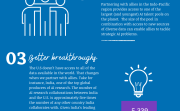Artificial Intelligence
From facial recognition to cyberdefense, advances in artificial intelligence present a variety of policy risks and benefits. The Science and Technology Innovation Program explores current and future applications of autonomous intelligent systems, identifies key experts, and translates what AI will mean for global security.
Flagship Project, Beyond Bans
The Wilson Center’s Science and Technology Innovation Program (STIP) seeks to understand, translate, and demonstrate the complexity of emerging technologies, like FRT, including safety, security, and ethical concerns. We focus on audiences ranging from the public policy community, to academic researchers, the press, and the general public. Legislative and Executive Artificial Intelligence (AI) Labs are a nonpartisan, off-the-record forum for offering Congressional staff and Federal employees context and a deep dive on AI trends with leading experts from the field.
STIP is launching a new research program, “Beyond Bans,” to address these gaps. Beyond Bans will establish and explore the complexity behind a range of AI ethical issues, beginning with facial recognition. Our research in this area shows this is not a simple issue and will take a unique approach with multiple stakeholders involved. One early publication on Policy Options for Facial Recognition and the Need for a Grand Strategy on AI advocates for considering ethical FRT through a more holistic lens that includes principles, definitions, standards, and concrete guidelines.
More on Facial Recognition from STIP....
More Insights & Analysis in AI
Past Work in AI

Unpacking Transparency to Support Ethical AI





